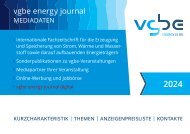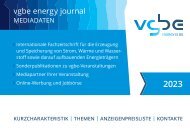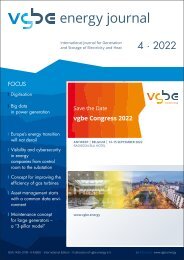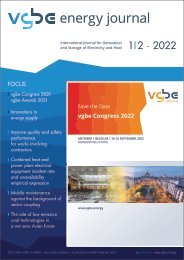VGB POWERTECH Issue 1/2 (2020)
VGB PowerTech - International Journal for Generation and Storage of Electricity and Heat. Issue 1/2 (2020). Technical Journal of the VGB PowerTech Association. Energy is us! Sector coupling. RWE Project ALIGN-CCUS. Passive acoustic imaging in power plants.
VGB PowerTech - International Journal for Generation and Storage of Electricity and Heat. Issue 1/2 (2020).
Technical Journal of the VGB PowerTech Association. Energy is us!
Sector coupling. RWE Project ALIGN-CCUS. Passive acoustic imaging in power plants.
Sie wollen auch ein ePaper? Erhöhen Sie die Reichweite Ihrer Titel.
YUMPU macht aus Druck-PDFs automatisch weboptimierte ePaper, die Google liebt.
<strong>VGB</strong> PowerTech 1/2 l <strong>2020</strong><br />
Editorial<br />
2019: Numbers<br />
Dear Ladies,<br />
Dear Sirs,<br />
Numbers do not lie if they are<br />
the right ones and if they are<br />
correct. But don’t start with<br />
pessimism when it comes<br />
to looking at current figures<br />
from the energy industry.<br />
A statement by Margrethe Vestager,<br />
Vice President of the<br />
EU Commission, in December<br />
2019 shows that figures can be<br />
impressive and thought-provoking,<br />
or that they can stand<br />
for necessary innovations. The EU Commissioner referred to a<br />
study by E.ON, according to which in 2017 around 200 billion<br />
kilowatt hours of electricity were consumed globally through<br />
streaming services, i.e. TV and Skype alone, with a clear upward<br />
trend. And this is only one figure that shows the importance<br />
of increasing digitalization in energy consumption. This<br />
represents another major challenge for the EU’s goal, also issued<br />
in December, of making the continent climate-neutral by<br />
2050, said Margrethe Vestager.<br />
Among other things, the study by E.ON reveals another interesting<br />
figure, which refers to the omnipresent “googling”:<br />
According to this, a search query triggers an electricity consumption<br />
of 0.3 watt hours, not much for our industry, which<br />
provides around 3,300 terawatt hours (TWh, 3,300 billion<br />
kilowatt hours, 3,300,000 billion watt hours) annually for consumers<br />
in Europe. But with around 40,000 search queries per<br />
second worldwide (as of 2017), these individual values already<br />
add up and become increasingly important for energy supply<br />
and sustainability strategies.<br />
At national level, initial figures on energy consumption and<br />
energy consumption trends are available for Germany, among<br />
others. According to a current evaluation by the Federal Association<br />
of the Energy and Water Industries (BDEW), in 2019<br />
Germany consumed 2 percent less electricity and 3.3 percent<br />
more gas than in the previous year.<br />
The decline in electricity consumption was mainly due to the<br />
economic downturn. Industry, the largest electricity consumer<br />
with a share of almost 46 percent, had already been using<br />
less electricity for months due to the weaker economic situation.<br />
While initially only the drop in production in the powerintensive<br />
industries contributed significantly to the decrease<br />
in consumption, the development in the entire manufacturing<br />
industry is now responsible for this. Industrial electricity consumption,<br />
for example, fell by 4.1 percent compared with the<br />
previous year.<br />
According to preliminary figures, a total of 511 billion kilowatt<br />
hours of electricity were consumed in 2019. Despite the declines,<br />
the largest consumer was industry with 234 billion kWh<br />
(45.7 percent), followed by public institutions, agriculture,<br />
trade and industry with 140 billion kWh (27.4 percent) and<br />
households with around 126 billion kWh (24.6 percent). The<br />
transport sector accounted for just under 12 kWh (2.3 percent).<br />
However, according to BDEW, the decline should not<br />
be regarded as an indication of a general decline in electricity<br />
consumption. The increasing electrification of the heating and<br />
transport sector would increase the demand for electricity in<br />
the medium and long term. The same applies to digitisation,<br />
with which the number of electronically operated devices and<br />
the power consumption of data centers will increase, and in<br />
addition, there will be the further effects of sector coupling,<br />
which may lead to higher consumption on the part of power<br />
generation, but will result in lower values in the overall context<br />
of energy consumption and emission reduction.<br />
As far as the structures of energy consumption and electricity<br />
generation in Germany are concerned, two remarkable figures<br />
can be noticed:<br />
Six million tonnes of CO 2 were saved in 2019 as a result of the<br />
increased use of gas-fired power plants for electricity generation.<br />
With 91 terawatt hours of electricity from natural gas,<br />
more electricity than ever before in Germany came from gas<br />
power plants. This represents an increase of 7.5 TWh compared<br />
to the previous year.<br />
According to first estimates by the Arbeitsgemeinschaft Energiebilanzen<br />
(AGEB), the German Working Group on Energy<br />
Balances, renewable energies increased their contribution to<br />
total energy consumption by 4 percent in 2019. Wind power increased<br />
its contribution by 15 percent. Hydro power increased<br />
by 4 percent. Solar energy increased only slightly by 1 per cent.<br />
Biomass, which accounts for more than 50 percent of total renewables,<br />
grew 2 percent. Since renewables typically make a<br />
large contribution to power generation, this effect will have a<br />
correspondingly positive impact on our sector.<br />
Last but not least, a figure on environmental protection and<br />
climate conservation: According to calculations by the German<br />
Energy and Water Association (BDEW), the energy industry<br />
has reduced its CO 2 emissions by 44 percent by 2019 compared<br />
with 1990. This means that it will already significantly exceed<br />
the 40 percent reduction target for <strong>2020</strong> this year.<br />
Dipl.-Ing. Christopher Weßelmann<br />
Editor in Chief, <strong>VGB</strong> PowerTech, Essen, Germany<br />
* Sources: ec.europa.eu/eurostat/de/home, www.eon.com,<br />
www.ag-energiebilanzen.de, www.bdew.de<br />
1


















